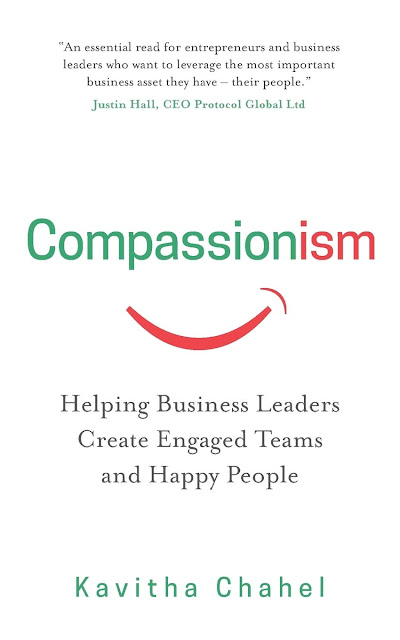BOOK REVIEW: Compassionism by Kavitha Chahel

Compassionism: Helping Business Leaders Create Engaged Teams and Happy People
Whatever your role, if you lead people and want them to make a positive contribution within your organisation, this book is essential reading. Yes, the front cover is adorned with an oh-so-common platitude regarding people being the ‘greatest asset’. And, no, it is not about being a fluffy, soft, or cuddly leader. Compassionism is a candid, open, relationship-orientated book that hones in on collective communication and humanity. It is a book about people influencing people in a meaningful way. There are, nevertheless, nods to more sympathetic, lenient, and gentler qualities of leadership and management… and rightly so. To lead people, we really ought to do so in an authentic way which shows that we actually care about them and are there for them. Without these seemingly underutilised quieter qualities, leaders will continue to grapple with actually connecting to their people — the world of work needs more leaders who care about their people and this book animates that idea greatly.
Compassionism seeks to transform workplaces from ‘surviving to thriving’, predominantly placing trust as paramount therein. It repeatedly encourages the reader to think about being acutely aware that they are imperfect, vulnerable, and entirely human. In doing so, trust is fostered and performance is bolstered, since we’re all in some form of relationship with one-another, where loyalty can make or break teams and organisational performance.
We live in a world where industrial age leadership and management still somehow prevails in many organisations, and this book gets it. Compassion… is this a difficult trait to embody? Why do we not see much more of it? We’re all human after all. The author, Kavitha Chahel, consistently brings this point home and her focus on “Self-awareness, Acceptance, Mindfulness, and Engagement” are her enabler for this. These traits set a foundation whereby leaders, who are in balance with themselves, can begin to connect in a more significant and genuine way with their people. Leaders need to be committed to the people around them if they want their teams to succeed and/or work consistently, and sustainably, near their individual capacities. This is how organisations continue and succeed over their competitors.
The book is also peppered with stimulating and thought-provoking questions along with free text space for the reader to write their unique answers. This further cements the idea that the leader needs to invest in knowing themselves, allowing them to be self aware before attempting to know and influence others.
The author argues that compassion as a behavioural trait nurtures a workforce to become more productive, creative, and collaborative. It’s hard to argue against the benefits that these outcomes bring within a serious organisation. Compassionism engenders the power of humanity and compassion out into the open, a book that goes some way to help bring about positive transformation and a happier, healthier workplace experience. Furthermore, organisations will be better able to face the one thing that is always upon them: change. Efficient, engaged, and thinking teams tackle uncertainty with far greater speed and coherence than those who endure an industrial age leadership approach, regardless of the type of organisation. Chahel argues that our humanity and compassion are key to this, a train of thought that is difficult to rebuke.
In agreement with Chahel, ‘the world needs more compassion and kindness and less greed, power and control’. In light of this way of thinking; leaders are able to empower their people while freeing themselves up to focus on supporting them as they go about their workplace endeavours. Compassionism repeatedly and admirably focuses on the people, quietly communicating with them in a way that is generative and that brings out the best in them. We all need more of this. Teams being led by a person who embodies compassion and humanity will wilfully collaborate, be curious, and have an innate desire to succeed — pitching them on a continual path of progression and making them evermore efficient. This goes full circle; the leader is then able to focus less on process and more on people. Win win win.
Any book that humanises workplace relationships in order to create and sustain a culture of trust, loyalty, and commitment, gets my vote. Well recommended read.


